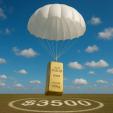Dollar tightly bound in lower 102 yen ahead of U.S. jobs data
Tokyo (June 6) The U.S. dollar moved narrowly in the lower 102 yen zone in Tokyo's Friday trading as risk-wary investors awaited key U.S. employment data due out later in the day.
At 5 p.m. , the dollar fetched 102.26-27 yen compared with 102.37-47 yen in New York and 102.53-54 yen in Tokyo at 5 p.m. Thursday . It moved between 102.23 yen and 102.45 yen during the day, changing hands most frequently at 102.34 yen .
The euro was quoted at $1.3647-3648 and 139.56-60 yen against $1.3655-3665 and 139.86-96 yen in New York and $1.3609-3610 and 139.54-58 yen in Tokyo late Thursday afternoon.
Hopes are broadly high for the May U.S. nonfarm payrolls, a key measure the Federal Reserve uses to monitor economic recovery, but some mixed data earlier in the week have widened the breadth of market estimates, leaving traders wary of making bold moves beforehand, said Toshiyuki Suzuki , senior market economist at the Bank of Tokyo-Mitsubishi UFJ .
Automatic Data Processing Inc.'s May U.S. jobs report Wednesday "was weaker than expected, and we now see a wide range of predictions, so a cautious mood has enveloped Tokyo trading," Suzuki said.
The dollar has time to break over 103 yen following the payrolls announcement if the data are sufficiently upbeat, ahead of the next big event, the Federal Open Market Committee the week after next, said Shinichiro Kadota , foreign exchange strategist at Barclays Bank .
"Our estimates for tonight's data are 225,000 U.S. jobs added in May, and an unchanged 6.3 percent unemployment rate," Kadota said.
"A barrier to risk sentiment will have been removed following the jobs data, but the dollar has been tightly bound between 101 and 104 yen recently and will likely stay there in the run-up to the FOMC," he said.
The European Central Bank decided Thursday to cut interest rates to record lows and take the unprecedented step of introducing a negative interest rate on bank deposits to bolster the sluggish economy, but the move fell in line with most market expectations, leaving the common currency stable in Tokyo trading, Suzuki said.
"As with many ECB meetings, traders decided to 'buy the rumor, sell the fact,'" he said, meaning they offloaded euros and European bonds ahead of the event before repurchasing them afterward.
"But some investors couldn't wait and adjusted their positions longer on euros over the past few days, then ended up getting burned as the currency swung down and then up following the rates decision," he said.
The ECB still has other tools left to ward off deflation, and market participants are looking to its next move, Suzuki added.
Source: Japan Economic Newswire










